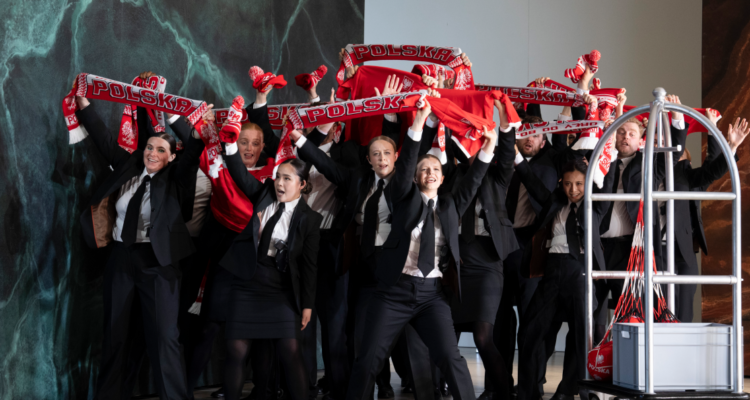Un Giorno Di Regno Ossia Il Finto Stanislao
Verdi was commissioned to compose Regno, a comedy, his second opera for La Scala. During composition both his children, and his wife died. He pleaded unsuccessfully to be released from his contract; he could not compose a comedy whilst his life crashed around him. The first night flopped – was mainly due to the singers – specialists in opera seria with no talent for comedy. All performances were cancelled. Regno was reproduced successfully in Rome and Naples with the right singers. Discouraged by the first night booing and hissing, he never composed another comedy, until his last work, Falstaff. Had Garsington’s brilliant production appeared at La Scala the show would have kept on running. Verdi, encouraged, might have composed more comedies.
The music is derivative of Rossini/Donizetti, with Verdi’s individual bounce. A musical ear can pick out many ‘coming shortly’ themes developed in later operas. The story: our hero Belfiore, an officer in King Stanislaus’ Polish army, is ordered to impersonate Stanislaus in Italy for 24 hours whilst Stanislaus escapes to Warsaw to reclaim his crown. Stanislaus’ instructions arrive in Polish text messages. Two feisty women dominate. The Marchesa del Poggio, the Barone di Kelbar’s niece, loves Belfiore, but is force-betrothed to Count Ivrea. Giulietta, Kelbar’s daughter, loves Edoardo, but force-betrothed to Rocco. Belfiore uses his kingly 24 hours to ensure a happy ending.
The visual gags are delightfully never-ending. Barone Kelbar is an arms dealer – a screen with up-to-date, funny newsflashes is marked ‘Kelbar Defense Limited’, show all the weapons he sells from drones to warheads. The newsflashes give background to the story – Polish King disappears – My Kingdom for a King’. Belfiore, hands out POLSKA football scarves and T-shirts to a rousing football chorus, joined by the Polish team on huge screen. Belfiore, finally released by text from kingly duties, reveals all in excellent Polish. Nobody understands Polish. Some scramble to the supertitles for the translation. There is a brilliantly-timed duel-to-the-death-by-pasta (pasta is serious business in Italy). A karaoke to Edouard’s cabaletta gives two other tenors their time to shine. An on-screen bomb countdown adds excitement at the end.
Verdi, is demanding of his singers, even for a comedy. This production also demands comic acting and good timing skills, which all the soloists have.
English mezzo Christine Rice, MBE, as Marchesa is the standout singer of the show. She easily knocks off the demanding music, especially her first aria – un cor innamorato – with difficult cabalettas trills. She has a warm voice, lovely vocal line, and great coloratura, bringing her feistiness into the vocal delivery. Arriving pulling wheelie luggage in a green leopard-print trouser-suit, her facial expressions are larger-than-life and funny. Her feisty Marchesa is bright (mezzos are always brighter than sopranos!) She sees through Belfiore’s disguise, but is miserable because he ignores her.
Canadian baritone Joshua Hopkins is perfect as Belfiore, swaggering wondrously as the fake king. Dressed in kingly attire with crown, pink ermine and purple sequin boots, he is hoot and a seductive singer.
English bass-baritone Henry Waddington as Baron Kelbar and Australian/British baritone as Rocco both have first-rate voices, excellent Italian with perfect comic timing for their duel by pasta.
American soprano Madison Leonard as slightly-dim-but-feisty Giulia is an anti-monarchist terrorist. We meet her receiving DIY bomb kit and ‘Not My King’ poster behind. Sporting short wedding dress, fishnet tights, and boots, she easily sings the tricky music. She presumably met disapproved-well-below-her-class Eduardo in a terrorist group.
New Zealand tenor Oliver Sewell is lightweight as Edouardo. His ‘e’ vowel is closed and tight, as is ‘o’ in amor. This blocks the voice from soaring, which this music needs. If he frees the vowels, this should solve his problem.
British tenor Robert Murray as compere host Ivrea is suitable oily and amusing.
Conductor Chris Hopkins maintains a brisk pace with fast tempi, ensuring the performance fizzes from the first note to the last.
Perfect for both opera newcomers and long-time fans, this is a show you shouldn’t miss!
Melodramma Giocoso in Two Acts
Music by Giuseppe Verdi (1813-1901)
Libretto by Felice Romani
Conducted by Chris Hopkins
Directed by Christopher Alden
First performance 5th December 1840
Photo Richard Hubert Smith
Cast includes Christine Rice, Madison Leonard, Henry Waddington, Grant Doyle, Joshua Hopkins, Oliver Sewell, Robert Murray, James Micklethwaite
Running time 2 hours plus one supper interval of 90 minutes.
Until 22nd July

